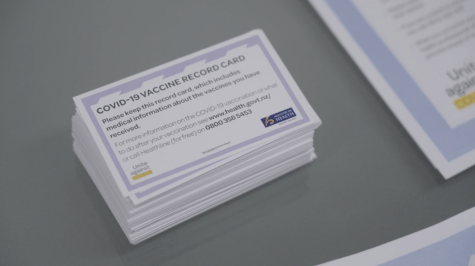Quinnipiac mandates COVID-19 vaccine for 2021-22 academic year
May 27, 2021
Quinnipiac University will require all students, faculty and staff to be vaccinated against COVID-19 for the 2021-22 academic year, according to President Judy Olian’s May 26 email.
“By having universal vaccination with limited exemptions across the Quinnipiac community, we will be able to return to virtually all facets of life on campus,” Olian wrote in the email. “Teaching, learning, research and student life will be able to occur in person, on campus and with few restrictions.”
Students must upload vaccination records to the Student Health Services patient portal by Aug. 1, and employees are instructed to submit records to the human resource portal where information will be retained by the Office of Human Resources.

In lieu of new protocols, the university is adamant about ensuring there is a sense of equality for those vaccinated and those who are not.
“We want to be very clear about avoiding a two-class citizen for our students this fall, those who are vaccinated and those who aren’t,” said David Hill, Quinnipiac’s senior medical adviser for COVID-19 task force. “We really want to avoid creating a sense of stigma or bias against those who aren’t.”
Individuals who are not vaccinated are not required to go online for the semester and can still return to campus if they have approved forms of medical or religious exemptions.
“We are certainly not going to lock out a student who’s done everything right except chooses not to get the vaccine from being a Quinnipiac student,” Hill said. “… For our students (who), for whatever reason, are not vaccinated, they should be protected by the community who is largely vaccinated.”
In response to the university’s decision, some students are in favor of the decision at large and the effects it will have on-campus life in the fall.
“I support Quinnipiac’s decision to mandate vaccines for the fall semester because I want to truly experience what college is like,” said Ephemia Nicolakis, a sophomore graphic design and public relations double major. “The science behind vaccines is truly promising and if that means that we can get to a closer means of normal, I am all for supporting it.”
Other students, like senior advertising and integrated communications and media studies double major Elisa Leone, think getting vaccinated should not be the university’s choice.
“I don’t support Quinnipiac mandating the vaccine because I feel like students should have the choice of whether or not they want to get it considering the high survival rate of COVID,” Leone said.
Though she disagrees with the vaccination mandate, Leone said she supports students who want to be vaccinated because of the benefits to the Quinnipiac community.
The university made the decision to switch from an incentive-based structure in hopes of having more “pre-COVID academic and social interactions.” It is anticipated that classrooms will return to full capacity, weekly COVID-19 testing will be eliminated and student life programming will increase due to the mandate.
Despite the intended changes, the university will still test symptomatic individuals and urges community members to abide by their own comfort levels regarding mask wearing.
“As we get closer to the start of the fall semester, the possibility of a one-time test for all students at the start of the semester is currently being assessed,” Olian wrote. “Masking requirements will be determined in alignment with state rules and medical advice.”
Hill said the removal of distancing in classrooms is likely for the fall semester, but masks may still be required in some settings.
“It’s gonna take a while for people to be comfortable to go without masks,” Hill said. “… I think to go into our classrooms in the fall, nobody masked, maybe we wouldn’t go that far.”
Olian said exemptions will be granted for medical and religious reasons, despite Connecticut’s removal of religious reasons. Students will soon be receiving a form to request exemption that will be confidentially reviewed by Student Health Services. Employees can send requests to [email protected] or contact Anna Spragg, associate vice president for human resources and total rewards.
International students who are unable to secure vaccinations in their home countries can request temporary exemption until their arrival in the United States, while also still following traveling procedures of testing and quarantining.
However, Hill said that it is likely that international students would be instructed to receive their vaccination at an off-site location instead of on campus. Any vaccine approved by the World Health Organization is accepted to fulfill the requirement.
Any community member interested in learning more about vaccinations is encouraged to visit the university’s vaccine resource page and frequently asked questions page for further guidance.
Until then, the university intends on continuing to reevaluate the linguistics behind policies and guidelines upon student arrival.
“It is probably too early to speculate on what the definitive plans will be for the fall,” said John Morgan, associate vice president for public relations. “We will be reviewing them later in the summer so that we can give you a complete picture then.”











